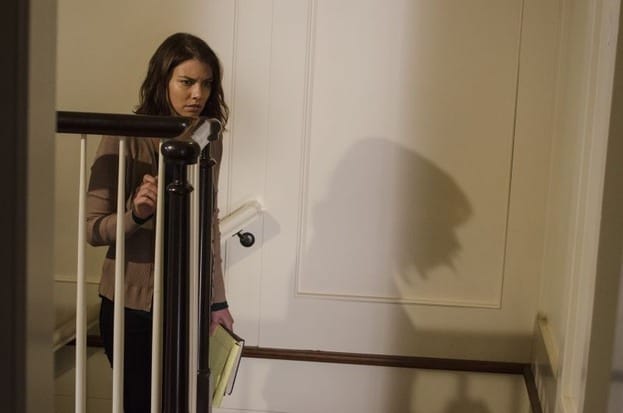
There should be a sign above Alexandria that reads “The Great White Hope”: not only is the town seemingly absent of anyone but white people, but The Walking Dead‘s new central location has kicked off a series of events that place its non-white characters in… questionable situations. In this episode alone, Gabriel establishes himself as a snitch and coward once again (while another, paler coward is shedding the same cowardly skin) and Noah gets a decidedly brutal death – and with Sasha off in the woods making crazy face, there’s really no “hope” for any of its primary, non-white characters (Rosita is… well, she’s sleeping in Abraham’s bed).
Then again, there’s really no hope for anybody on The Walking Dead, is there? If “Spend” does anything outside of further The Walking Dead‘s abhorrent reputation regarding race, it condenses the show’s cyclical hope-turns-to-blood arc into a single hour, rather than the multiple episodes or near-season-long (The Farm) approach previous stories have taken. There are already so many threats to the supposed “peace” of Alexandria, both external and internal, that every single story is a ticking time bomb of sorts – which negates any kind of surprise that may stem from establishing a new conflict, with the show’s inability to tell any story with any kind of subtlety. It’s been two episodes, and Rick is already considering murdering the abusive husband of a woman he has a crush on, while Gabriel is snitching to the congresswoman that the group should not be trusted (while she herself is suddenly questioning her own decisions to put the group in power) – anyone who thought the walls of Alexandria would provide new avenues for storytelling were grossly mistaken.
The majority of it is so predictable. Both Noah and Aiden’s deaths are telegraphed by their conversations with adult figures: as soon as Noah begins talking about his dreams, it’s obvious he’s going to die, just like when Aiden tells his father to be safe (his father, who built the frickin’ walls around the town), the irony of his dialogue betrays the eventual death of his character – which, let’s be honest, was earned, because he was an idiot. The Walking Dead again proves to be a slave to its own formula for killing off a character, a progression of story that is becoming abundantly obvious in the show’s deadliest season to date.
And then there’s Pete, whose character development amounts to him offering Rick a beer and walking around with his chest puffed out, which immediately establishes him as a Wife-Beating Drunk. The concept of this story is at least interesting – how does one reinforce the assumed laws of society when there’s no such thing as laws, or society? – but the execution of it in “Spend” is uneven, see-sawing back from the wonderfully suggestive (the unraveling mystery of the broken owl statue) to the shamelessly overt (everything Nicholas does), and never giving a character like Pete the chance to be anything but a device of personal vengeance for Carol – and in the process, raising the question of how Rick and Carol figured this out so quickly, when dozens of other people in the town interacted with them for months, in a closed space.
That mix of rewarding (the image of Abraham leading a bunch of zombies in a dubstep-bumping van) and laughable (again, how obvious Noah and Aiden’s impending deaths are) makes for a very frustrating hour of television, and makes “Spend” tough to judge as a whole. On the one hand, we get terrific moments like Abraham’s quest for inner peace and the interesting juxtaposition of Alexandria as a peaceful place full of terrible people – but on the other hand, “Spend” has the feeling it’s building momentum towards a number of familiar outcomes, relying on the convenient formulas of character disposal and conflict establishment it’s employed to lesser and lesser effect throughout its five seasons. When The Walking Dead shows an aptitude to try something different, be it action pieces or character work (again, Carol’s transformation throughout the show has been terrific, even if she’s reduced to a plot point in a Lifetime movie in this episode), it is a much more engaging and resoundingly less predictable affair.
Unfortunately, the promising moments of “Spend” remain buried under the weird racial politics of The Walking Dead, which pushes two secondary, minority characters to the forefront for a moment (we’ve barely seen Gabriel this half-season, remember), only to kill one off and paint another as a traitor and a coward. Intentional or not, this is the most disturbing pattern of The Walking Dead‘s many tics and habits (habits that include bringing Rick’s group to a group of “survivors” that seem like total idiots), and one the show only continues to further throughout the second half of its most popular season to date.
[Photo via AMC]
 Follow Us
Follow Us
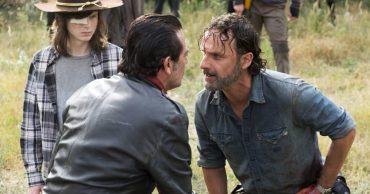
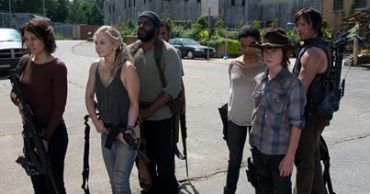
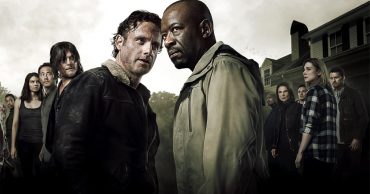
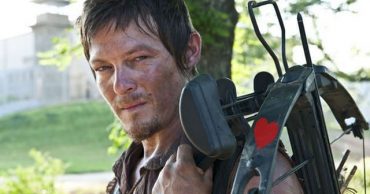

Horrible review.